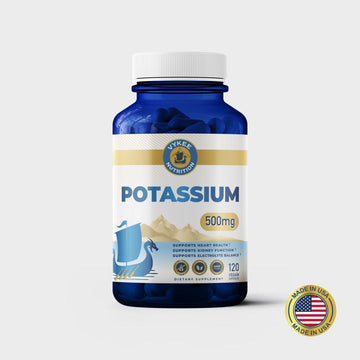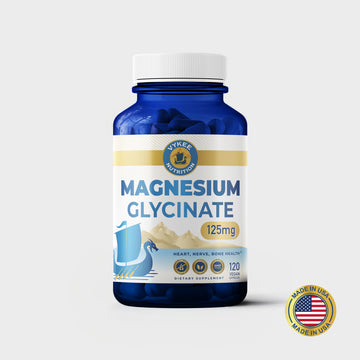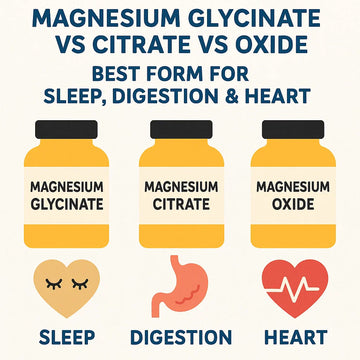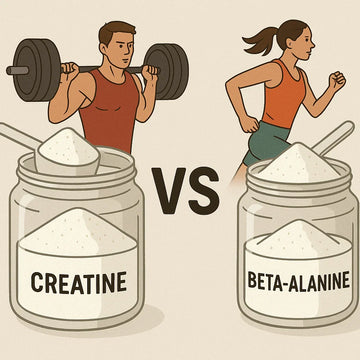Why Magnesium Matters
Magnesium is an essential mineral that powers over 300 enzymatic processes in the body. It supports muscle contraction, nerve signaling, heart rhythm, energy production, and sleep regulation. Yet, studies show that nearly 50% of adults in Europe and North America do not get enough magnesium from diet alone (NIH ODS).
That’s where supplementation comes in. But not all magnesium supplements are created equal. Magnesium glycinate, citrate, and oxide differ in absorption, benefits, and side effects. Choosing the right form can make the difference between better sleep, improved digestion, or frustration with little results.
Quick Comparison: Magnesium Glycinate vs Citrate vs Oxide
| Form | Absorption | Best Uses | Potential Drawbacks |
|---|---|---|---|
| Magnesium Glycinate | High absorption, gentle on stomach | Sleep, relaxation, stress, anxiety, blood pressure | More expensive than other forms |
| Magnesium Citrate | Well absorbed | Digestion, constipation relief, hydration, muscle recovery | May cause loose stools in higher doses |
| Magnesium Oxide | Low absorption (~4%) | Occasional constipation relief, cost-effective | Not ideal for correcting deficiency; can cause cramping |
Magnesium Glycinate
What it is: Magnesium bound to the amino acid glycine. This form is chelated, meaning it’s highly bioavailable and gentle on digestion.
Benefits
- Promotes sleep and relaxation by increasing GABA activity.
- Supports heart health by regulating blood pressure and rhythm.
- Helps with stress and anxiety management.
- Gentle on the stomach — no laxative effect.
Best For
- People struggling with insomnia, stress, or anxiety.
- Individuals with high blood pressure or cardiovascular concerns.
- Those who need long-term supplementation with minimal side effects.
Magnesium Citrate
What it is: Magnesium combined with citric acid. Known for its good absorption and mild laxative effect.
Benefits
- Supports digestion and helps relieve mild constipation.
- Provides hydration support by balancing electrolytes.
- Well absorbed, making it a good all-rounder for deficiency correction.
Best For
- People with occasional constipation or digestive sluggishness.
- Athletes needing hydration and recovery support.
- Those who want a balance between absorption and digestive support.
Magnesium Oxide
What it is: Magnesium bound to oxygen. Contains a high percentage of elemental magnesium but is poorly absorbed by the body.
Benefits
- Acts as a laxative for short-term constipation relief.
- Affordable and widely available.
Best For
- Short-term use for constipation.
- Budget-conscious supplementation.
Magnesium Use Cases
| Health Goal | Best Form | Why |
|---|---|---|
| Better Sleep | Glycinate | Calming effect, supports melatonin and GABA |
| Stress & Anxiety | Glycinate | Gentle, promotes relaxation without laxative effect |
| Digestive Health | Citrate | Mild laxative, supports hydration and bowel regularity |
| Exercise Recovery | Citrate / Glycinate | Replenishes electrolytes, relaxes muscles, prevents cramps |
| Budget Supplementation | Oxide | Cheap, but less effective for correcting deficiency |
Daily Needs & Dosage
- Recommended intake: 310–320 mg for women, 400–420 mg for men (NIH).
- Glycinate: 100–400 mg daily, often taken at night for relaxation.
- Citrate: 200–400 mg daily, divided with meals.
- Oxide: Typically used in 250–500 mg doses for constipation relief.
Always consult a healthcare provider before high-dose supplementation.
Safety & Side Effects
- Too little magnesium: cramps, fatigue, irregular heartbeat, poor sleep.
- Too much magnesium: diarrhea, nausea, abdominal pain.
- Kidney disease patients should avoid unsupervised magnesium supplementation.
Common Myths About Magnesium
- “All magnesium supplements are the same.” False — absorption and effects vary widely between forms.
- “Magnesium oxide is the best because it has the most magnesium.” False — it has high elemental magnesium but poor absorption (~4%).
- “Only people with deficiency need magnesium.” False — optimal magnesium levels support stress, sleep, and long-term cardiovascular health.
Vykee’s Viking Take
Magnesium is the mineral of balance. Vikings endured long voyages and harsh winters — resilience that began with strong bodies and steady nerves. Today, magnesium glycinate fuels calm and sleep, citrate supports digestion and hydration, and oxide serves as a tool for short-term relief. Choose your form like a warrior choosing the right weapon for battle.
More Relevant Information
- Vykee Magnesium & Minerals
- Heart Health support
- Magnesium Glycinate (Vykee blog)
- Creatine for Brain & Body (Vykee blog)
FAQs
Which magnesium form is best for sleep?
Magnesium glycinate — calming, well absorbed, and gentle on the stomach.
Which magnesium helps with constipation?
Magnesium citrate (gentle) or oxide (stronger). Both draw water into the intestines.
Can I take magnesium every day?
Yes, daily use is safe at recommended doses. Many people benefit from consistent intake.
Is it safe to combine magnesium forms?
Yes, some supplements blend glycinate (relaxation) with citrate (digestion) for comprehensive benefits.
When should I take magnesium?
Evening is best for glycinate (relaxation), while citrate may be better in the morning with food.
Can magnesium lower blood pressure?
Yes, especially glycinate — studies show magnesium helps regulate blood pressure and vascular tone.
Is magnesium safe during pregnancy?
Yes, but dosage should be guided by a healthcare provider. Magnesium supports muscle relaxation and reduces risk of cramps.
Conclusion
Magnesium is more than a supplement — it’s a foundation of resilience. Whether you seek calm sleep, digestive balance, heart support, or muscle recovery, the right magnesium form makes all the difference. Choose wisely, supplement consistently, and awaken your Viking vitality with Vykee.







